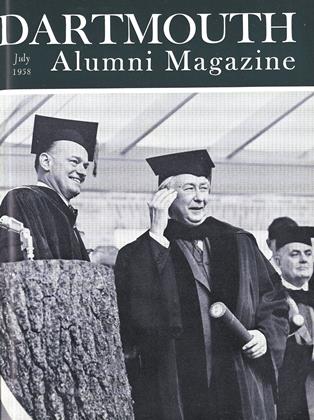Editedby Prof. Elias L. Rivers. Madrid: Espasa-Calpe, 1957. 151pp.
Many laborious years of devoted and lovingly persistent research have made possible the publication of this volume in Spanish containing a brief biography of Aldana, an analytical and bibliographical study of his works, autographic documents, and, of greatest importance, an annotated edition of his poetry, with invaluable philological and historical notes.
The composition of all this material is largely based on the revision of Professor Rivers' doctoral thesis presented at Yale University in 1952.
Francisco de Aldana, called "the divine" in his days, is an interesting figure of the Spanish Renaissance with a dual personality. A noble captain in the Spanish empire of the 16th century, when "the sun never set on its dominions," he combined, like his contemporary Cervantes, the pursuit of arms with his dedication to letters, being a true offspring of the spirit of the age. He was killed in the Battle of Alcazarquivir, in northern Africa, at the relatively young age of 41.
The poetry of Aldana abounds in lyrical outbursts of love, despair, exaltation of king and country, and even comic narratives in the familiar vein. But perhaps the most significant aspect of his literary endeavors is the consideration that he represents a certain transition from the lyrical humanism of Garcilaso de la Vega, so much concerned with golden bucolic nymphs and ethereal would-be shepherdesses, to the humanism of a deep religious preoccupation of an inquiring mind, particularly manifested in his long epistle to the humanist scholar Arias Montano, in which undoubtedly Aldana concentrated his greatest intellectual and artistic effort.
The volume has been published by Espasa- Calpe, Madrid, to form a new addition to the traditional Clásicos Castellanos. This is an old and venerable collection of Spanish literary classics which for many decades have been rigorously edited by the outstanding Spanish philologists. It is no small honor for a non-Spanish hispanist like Professor Rivers to be a member editor of such a group of scholars.
 View Full Issue
View Full Issue
More From This Issue
-
 Feature
FeatureThe Examined Life
July 1958 By THE REV. THEODORE M. HESBURGH -
 Feature
FeatureThe 1958 Commencement
July 1958 By C.E.W. -
 Feature
FeatureHONORARY DEGREE CITATIONS
July 1958 -
 Feature
FeatureSix Alumni Awards Bestowed
July 1958 -
 Feature
FeatureThe Capital Gifts Campaign To Date
July 1958 -
 Feature
FeatureThe Seniors' Valedictory
July 1958 By JAEGWON KIM '58
Books
-
 Books
BooksAlumni Publications
March 1934 -
 Books
BooksAlumni Articles
MARCH 1969 -
 Books
BooksTHE GEOGRAPHY OF POVERTY IN THE UNITED STATES.
NOVEMBER 1972 By ALBERT S. CARLSON -
 Books
BooksRoosevelt Smiled And Cassandra Wept
January 1976 By DAVID J. BRADLEY '38 M.D. -
 Books
BooksMAURICE HEWLETT: HISTORICAL ROMANCER
January 1939 By David Lambuth -
 Books
BooksIMAGINATION.
JULY 1963 By RALPH A. BURNS


